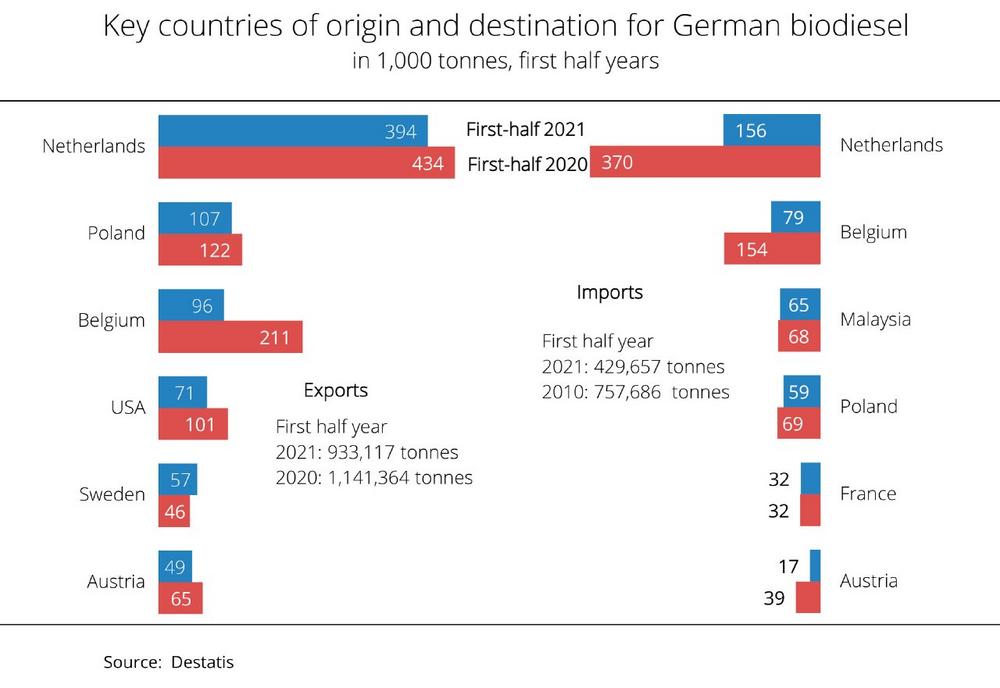German biodiesel exports remain above average

Breaking News:
Kathmandu Nepal
Dienstag, Apr 16, 2024

According to figures published by the German Federal Statistical Office, Germany exported around 933,117 tonnes of biodiesel in the first half of 2021 while importing only 429,657 tonnes. The Netherlands, the main EU marketplace for trading biodiesel, continued to be the primary trading partner, accounting for 42 per cent and 36 per cent of total exports and imports respectively. However, imports decreased significantly by 60 per cent. According to investigations conducted by Agrarmarkt Informations-Gesellschaft (mbH), larger import volumes also came from Belgium, Malaysia and Poland, although they were smaller than in the year-earlier period. Imports were dominated by supply from other EU countries (84 per cent). Malaysia was the most important non-EU supplier country, once more ranking third, but only providing just less than 65,000 tonnes of biodiesel.
The main recipient countries of German biodiesel also were EU countries (88 per cent), headed by the Netherlands, Poland and Belgium. The most important non-EU country was the USA. The country took fourth place in the first half of 2021, although imports dropped 30 per cent year-on-year to just below 71,000 tonnes.
The UFOP has pointed out that these statistics take into account exclusively biodiesel. They do not include paraffinic fuels such as hydrotreated vegetable oil (HVO). In light of today’s EU consumption level of approximately 3.6 million tonnes and the growing importance of such fuels in the future for meeting greenhouse gas reduction targets in all member states, the UFOP has underlined the urgent need to adapt official statistics – both at the domestic and the European level. More specifically, HVO should be listed separately.
The UFOP has explained that the fact that HVO is produced to a separate fuel specification and traded separately from biodiesel is an argument in favour of collecting HVO consumption data separately.
The association has pointed out that HVO can be blended in fossil diesel fuel at a rate of up to 26 per cent, which compares to a maximum rate of 7 per cent in the case of biodiesel. The promotion of synthetic fuels (e-fuels) as initiated by the German federal and state governments and the approvals vehicle manufacturers have given for pure fuel consuming operating mode are additional reasons for collecting statistics on paraffinic fuels separately. The UFOP has indicated that the volumes of HVO consumed in Germany will not be listed until the Bundesanstalt für Landwirtschaft (BLE – Federal Office for Agriculture and Food) publishes its Evaluation and Progress Report at the end of the year.
The Union for the Promotion of Oil and Protein Plants e. V. (UFOP) represents the political interests of companies, associations and institutions involved in the production, processing and marketing of domestic oil and protein plants in national and international bodies. UFOP supports research to optimise agricultural production and for the development of new recycling opportunities in the food, non-food and feed sectors. UFOP public relations aim to promote the marketing of domestic oil and protein plant end products.
UFOP – Union zur Förderung von Oel- und Proteinpflanzen e.V.
Claire-Waldoff-Str. 7
10117 Berlin
Telefon: +49 (30) 2359799-40
Telefax: +49 (30) 2359799-99
http://www.ufop.de
![]()